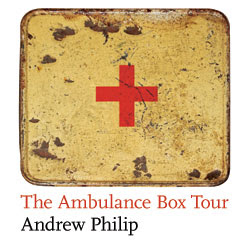Sleepers. A fine idea if you can book a berth but a complete misnomer if cash and demand force you into a recliner (read "seat that hardly moves back") for the eight-hour journey. And my seat on the way down to London was the worst possible option: right next to the door to the toilet area and facing another occupied seat. Lots of shuffling and stumbling about next to my head. Ergo, no sleep till berth time (ie, the return journey).
I arrived in London Euston at 7:01 am--godforsaken shed of a place at that hour. I'd left a sunny Sunday in Scotland to come to a sodden Monday in London, with 13 hours to fill before the reading. I had breakfast at chop'd* in St Pancras; found out when the British Library opened; made my way down to Earl's Court to locate the Troubadour and time the journey, picking up a copy of Geoffrey Hill's Canaan for £1.50 en route in a Samaritans book shop; went back up to the British Library, where I sat in the cafe and mulled over a set for the evening before wandering round the exhibition on the Ramayana (fascinating, but a bit much on so little sleep); had lunch in a random noodle bar and observed the terminally damp Africa Day concert in Trafalgar Square.
Then, at 3pm, I was rescued from my wet solitude when I met up with Siriol Troup and Lorraine Mariner for coffee in the National Gallery. Siriol, Lorraine and I also went to the exhibition of new Alison Watt paintings. Beautiful, haunting work, as I've come to expect from Watt. In these, the sense of presence-in-absence is intensified by a new feature: substantial openings in the folds in the fabric that draw the eye, as you can see in this image.
After the gallery, we hopped on the Tube down to Earl's Court and the Troubadour. Helena Nelson and Eleanor Livingstone were already there waiting for the HappenStance band and supporters slowly gathered. Nell had me sign 50 copies of the sampler (sitting in a back room signing books: another sign of being a writer!). I'd not met any of the non-Scottish HappenStancers, but there were so many of us in the party I didn't get much of a chance to talk to them. However, I did have a great natter with Katy Evans-Bush of Baroque in Hackney fame and the chance to catch up with Sinéad Wilson, who I hadn't seen in a few years.
The reading was downstairs in the cellar bar and, when we headed down there, the place was already reasonably full. I was utterly amazed and delighted to see one of my Dutch friends among the audience, another friend I hadn't seen for ages. (He was in the country for an academic conference and had seen the reading trailed here.)
I was first up. At Nell's suggestion, I read the six uncollected poems from the sampler: "Singularity", "Lullaby", "Still" (which is a response to Alison Watt's painting of the same title), "Saxifrage", "Dream Family Holiday" and "Coronach". Not an easy set for the audience, perhaps, but it went down really well. It wasn't an easy set for nor for the other readers to follow either, but the reader who followed me directly was Rob A Mackenzie, whose set was completely different and superb, as I'd expect from him. (For me, his was the best set of the first half.)
There was just time in the break to chat to one or two friends and audience members but, unfortunately, I had to leave shortly after the second half began. However, I managed to hear Tom Duddy, who read quietly from his very fine pamphlet The Small Hours. For a good summary of the whole reading, see Rob's account. It was a shame not to be able to hear Michael Mackmin, whose Twenty-Three Poems is another strong chapbook, or Gregory Leadbetter, who I didn't get the chance to meet either, but at least I managed to sleep a bit on the train home!
All in all, it was a great trip. The reading buzzed with a livelier atmosphere than anything I've been at certainly in Edinburgh, possibly in Scotland full stop, and the audience was obviously attentive. In fact, the dozen copies of the sampler that Nell put out all sold, as did a good number of other pamphlets. Now, that just wouldn't happen in Edinburgh!
*Daft apostrophe but good hot porridge, which is just what a cold, wet traveller needed.

.jpg)





